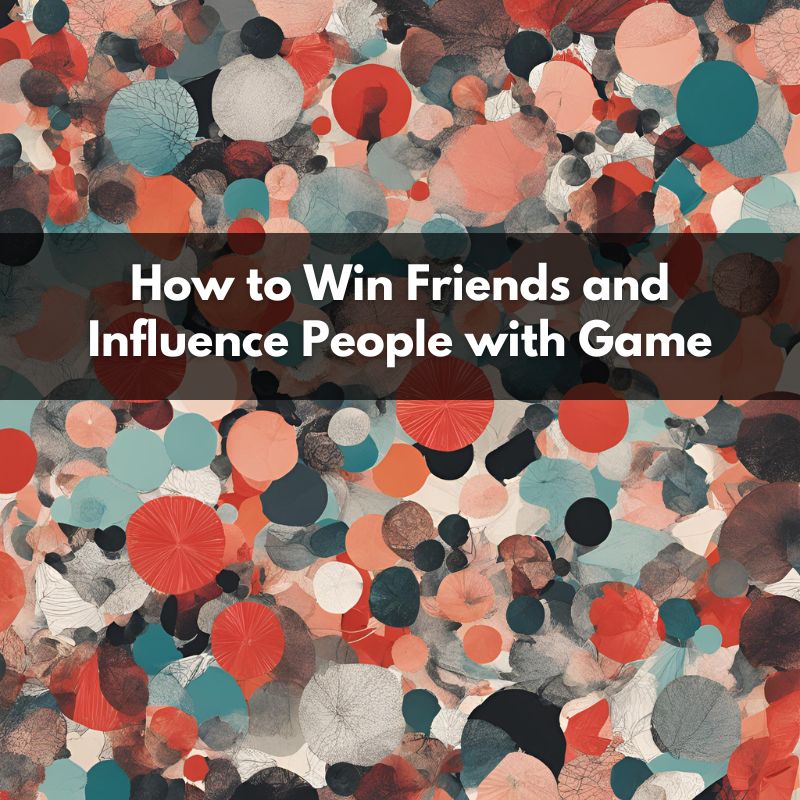
Winning friends and influencing people is a timeless skill, and integrating elements of gameplay can make the process even more effective and enjoyable. By approaching social interactions with a game-like mindset, you can enhance your ability to connect with others, build strong relationships, and positively influence those around you. This guide will explore how incorporating game strategies can help you win friends and influence people in a fun and meaningful way.
1. Gamify Your Social Interactions
Gamification involves applying game-like elements to non-game activities. Here’s how you can gamify your social interactions to make them more engaging:
- Set Social Goals: Treat your social interactions like missions. Set small, achievable goals such as initiating conversations, remembering people’s names, or making someone smile. Reward yourself when you accomplish these goals.
- Create Challenges: Challenge yourself to step out of your comfort zone. For example, make it a challenge to talk to three new people at a party or to find a common interest with someone you’ve just met.
- Use Social Points: Imagine you’re earning points for every positive interaction. Complimenting someone, offering help, or making someone laugh can earn you points in your mental game, motivating you to continue engaging with others.
2. Level Up Your Communication Skills
In games, leveling up means improving your abilities. In social situations, leveling up your communication skills can make you more effective in winning friends and influencing others:
- Active Listening: Just like in a game where you need to pay attention to details, active listening is key to understanding others. Listen carefully, ask questions, and show genuine interest in what others are saying.
- Effective Storytelling: Good stories captivate players in games, and they can do the same in social interactions. Practice telling engaging stories that resonate with your audience, making you more memorable and influential.
- Body Language: Non-verbal cues are critical in games and social settings. Maintain eye contact, use open and positive body language, and be mindful of your tone and gestures to convey confidence and approachability.
3. Build Alliances Through Collaboration
In many games, forming alliances is crucial for success. The same concept applies to social interactions:
- Collaborate on Common Interests: Identify shared interests or goals with others and work together on them. This can be as simple as planning a group activity or collaborating on a project at work. Collaborative efforts build trust and strengthen relationships.
- Be a Team Player: Just like in cooperative games, being supportive and reliable makes you a valued member of any social circle. Offer your help when needed, be dependable, and show appreciation for others’ contributions.
- Foster Inclusivity: In games, including everyone on your team is important for success. Similarly, make an effort to include others in conversations and activities, ensuring no one feels left out.
4. Master the Art of Persuasion
Games often involve persuading others to join your cause or support your strategy. In social interactions, persuasion is key to influencing others:
- Understand Motivations: Just as you would analyze a game opponent’s moves, take time to understand what motivates the people you want to influence. Tailor your approach based on their interests, needs, and desires.
- Use Reciprocity: In many games, helping others can lead to mutual benefits. Offer your assistance or a favor, and people will be more likely to return the gesture, creating a positive cycle of influence.
- Present Win-Win Scenarios: In negotiations, aim for outcomes where everyone benefits. This approach builds goodwill and makes others more inclined to support your ideas or initiatives.
5. Use Strategic Thinking to Navigate Social Dynamics
Strategic thinking is essential in games and can be equally valuable in social situations:
- Read the Room: Just as you would assess the environment in a game, observe the social dynamics in any setting. Identify key players, understand the group’s mood, and adjust your approach accordingly.
- Anticipate Reactions: In games, anticipating opponents’ moves can give you an advantage. Similarly, think ahead about how people might react to your words or actions and plan your interactions to steer conversations in a favorable direction.
- Adapt to Changes: Social situations can be unpredictable, just like games. Be flexible and ready to adjust your strategy if the dynamics change, whether it’s a shift in group mood or a new person joining the conversation.
6. Cultivate a Positive Social Persona
In many games, your character’s persona affects how others perceive and interact with you. The same applies in real life:
- Be Authentic: Just as gamers prefer authentic characters, people appreciate authenticity in social interactions. Be genuine in your interactions, which helps build trust and meaningful connections.
- Maintain a Positive Attitude: Positivity is contagious and can make you more likable. Approach interactions with optimism and enthusiasm, and others will be drawn to your energy.
- Develop Emotional Intelligence: Emotional intelligence is like having special powers in social games. Understand and manage your emotions, and empathize with others to navigate social interactions more effectively.
7. Reward and Acknowledge Others
In games, rewards are a powerful motivator. Use this concept to reinforce positive social interactions:
- Express Appreciation: Acknowledge others’ contributions, successes, or simply their presence. A small compliment or thank you can go a long way in building rapport and strengthening relationships.
- Celebrate Wins Together: Whether it’s a shared achievement or a personal milestone, celebrate with others. This not only reinforces your bond but also makes people associate you with positive experiences.
- Offer Recognition: In group settings, recognize individuals for their efforts. Public acknowledgment can boost their confidence and make them more likely to support and engage with you in the future.
8. Engage in Friendly Competition
Friendly competition can be a fun way to build relationships and influence others:
- Participate in Social Games: Engage in light-hearted games or competitions with friends or colleagues. Whether it’s a trivia night, board games, or sports, these activities create bonding opportunities and foster camaraderie.
- Challenge Others: Set up friendly challenges, like who can achieve a certain goal first or who can come up with the best idea. Competition can motivate everyone involved and create a dynamic, engaging environment.
- Be Gracious in Winning or Losing: Whether you win or lose, handle the outcome with grace. Congratulate others on their successes and be humble in victory. This attitude earns respect and strengthens your social connections.
9. Reflect on Your Social Interactions
In games, reviewing your performance helps you improve. The same applies to social interactions:
- Analyze Past Interactions: Reflect on your recent social interactions to identify what went well and what could be improved. Consider how your words, actions, and demeanor affected others.
- Seek Feedback: Ask trusted friends or colleagues for feedback on your social skills. Constructive criticism can provide valuable insights into areas for growth.
- Adjust and Improve: Use your reflections and feedback to refine your social strategies. Continuous improvement will help you become more effective in winning friends and influencing people over time.
Conclusion
Winning friends and influencing people can be an enjoyable and rewarding process when approached with a game-like mindset. By gamifying social interactions, leveling up your communication skills, building alliances, mastering persuasion, and strategically navigating social dynamics, you can foster meaningful relationships and positively impact those around you. Remember, the key to success is to keep the experience fun, engaging, and authentic, just like a great game.
